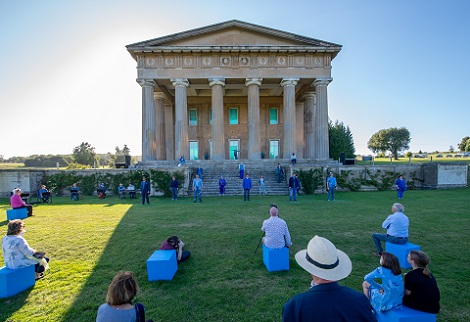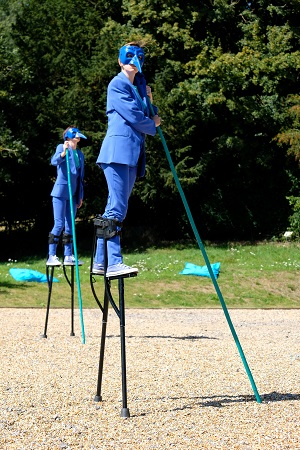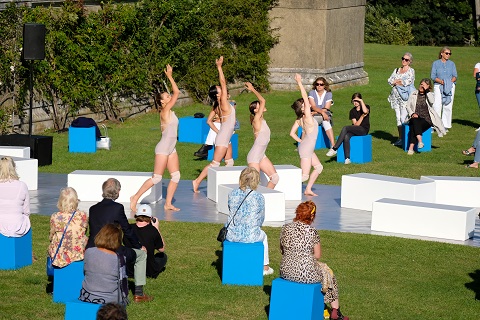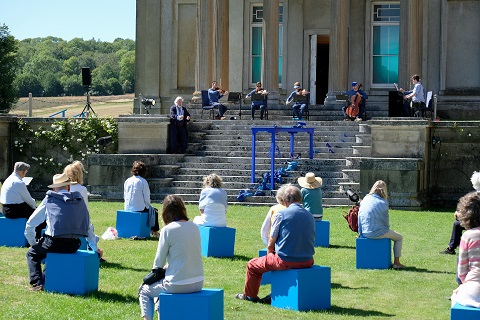Recently in Reviews
English Touring Opera are delighted to announce a season of lyric monodramas to tour nationally from October to December. The season features music for solo singer and piano by Argento, Britten, Tippett and Shostakovich with a bold and inventive approach to making opera during social distancing.
This tenth of ten Live from London concerts was in fact a recorded live performance from California. It was no less enjoyable for that, and it was also uplifting to learn that this wasn’t in fact the ‘last’ LfL event that we will be able to enjoy, courtesy of VOCES8 and their fellow vocal ensembles (more below …).
Ever since Wigmore Hall announced their superb series of autumn concerts, all streamed live and available free of charge, I’d been looking forward to this song recital by Ian Bostridge and Imogen Cooper.
The Sixteen continues its exploration of Henry Purcell’s Welcome Songs for Charles II. As with Robert King’s pioneering Purcell series begun over thirty years ago for Hyperion, Harry Christophers is recording two Welcome Songs per disc.
Although Stile Antico’s programme article for their Live from London recital introduced their selection from the many treasures of the English Renaissance in the context of the theological debates and upheavals of the Tudor and Elizabethan years, their performance was more evocative of private chamber music than of public liturgy.
In February this year, Albanian soprano Ermonela Jaho made a highly lauded debut recital at Wigmore Hall - a concert which both celebrated Opera Rara’s 50th anniversary and honoured the career of the Italian soprano Rosina Storchio (1872-1945), the star of verismo who created the title roles in Leoncavallo’s La bohème and Zazà, Mascagni’s Lodoletta and Puccini’s Madama Butterfly.
Evidently, face masks don’t stifle appreciative “Bravo!”s. And, reducing audience numbers doesn’t lower the volume of such acclamations. For, the audience at Wigmore Hall gave soprano Elizabeth Llewellyn and pianist Simon Lepper a greatly deserved warm reception and hearty response following this lunchtime recital of late-Romantic song.
Collapsology. Or, perhaps we should use the French word ‘Collapsologie’ because this is a transdisciplinary idea pretty much advocated by a series of French theorists - and apparently, mostly French theorists. It in essence focuses on the imminent collapse of modern society and all its layers - a series of escalating crises on a global scale: environmental, economic, geopolitical, governmental; the list is extensive.
For this week’s Live from London vocal recital we moved from the home of VOCES8, St Anne and St Agnes in the City of London, to Kings Place, where The Sixteen - who have been associate artists at the venue for some time - presented a programme of music and words bound together by the theme of ‘reflection’.
'Such is your divine Disposation that both you excellently understand, and royally entertaine the Exercise of Musicke.’
Amongst an avalanche of new Mahler recordings appearing at the moment (Das Lied von der Erde seems to be the most favoured, with three) this 1991 Mahler Second from the 2nd Kassel MahlerFest is one of the more interesting releases.
‘And there was war in heaven: Michael and his angels fought against the dragon; and the dragon fought and his angels, And prevailed not; neither was their place found any more in heaven … that old serpent … Satan, which deceiveth the whole world: he was cast out into the earth, and his angels were cast out with him.’
If there is one myth, it seems believed by some people today, that probably needs shattering it is that post-war recordings or performances of Wagner operas were always of exceptional quality. This 1949 Hamburg Tristan und Isolde is one of those recordings - though quite who is to blame for its many problems takes quite some unearthing.
There was never any doubt that the fifth of the twelve Met Stars Live in Concert broadcasts was going to be a palpably intense and vivid event, as well as a musically stunning and theatrically enervating experience.
‘Love’ was the theme for this Live from London performance by Apollo5. Given the complexity and diversity of that human emotion, and Apollo5’s reputation for versatility and diverse repertoire, ranging from Renaissance choral music to jazz, from contemporary classical works to popular song, it was no surprise that their programme spanned 500 years and several musical styles.
The Academy of St Martin in the Fields have titled their autumn series of eight concerts - which are taking place at 5pm and 7.30pm on two Saturdays each month at their home venue in Trafalgar Square, and being filmed for streaming the following Thursday - ‘re:connect’.
The London Symphony Orchestra opened their Autumn 2020 season with a homage to Oliver Knussen, who died at the age of 66 in July 2018. The programme traced a national musical lineage through the twentieth century, from Britten to Knussen, on to Mark-Anthony Turnage, and entwining the LSO and Rattle too.
With the Live from London digital vocal festival entering the second half of the series, the festival’s host, VOCES8, returned to their home at St Annes and St Agnes in the City of London to present a sequence of ‘Choral Dances’ - vocal music inspired by dance, embracing diverse genres from the Renaissance madrigal to swing jazz.
Just a few unison string wriggles from the opening of Mozart’s overture to Le nozze di Figaro are enough to make any opera-lover perch on the edge of their seat, in excited anticipation of the drama in music to come, so there could be no other curtain-raiser for this Gala Concert at the Royal Opera House, the latest instalment from ‘their House’ to ‘our houses’.
"Before the ending of the day, creator of all things, we pray that, with your accustomed mercy, you may watch over us."
Reviews

25 Aug 2020
Precipice: The Grange Festival
Music-making at this year’s Grange Festival Opera may have fallen silent in June and July, but the country house and extensive grounds of The Grange provided an ideal setting for a weekend of twelve specially conceived ‘promenade’ performances encompassing music and dance.
This was a collaborative response to the global health crisis compiled by director and writer Sinéad O'Neill and designer Joanna Parker. Entitled Precipice, the assemblage of hour-long outdoor presentations drew inspiration from both the collective experiences of the pandemic and the magnificent surroundings of this rural idyll, its grounds offering natural performance spaces and a home to families of geese, rooks and hawks whose presence prompted the theme of creation and renewal.
With a strolling audience limited to sixty people (invited to sit on socially distanced boxes or stand on marked crosses), and dancers and musicians occupying fixed positions, there was a sense of private guests being shown around animated displays in a stately home. Within this ‘new normal’, performers could almost have been museum exhibits, a sign of the past which the novelist L.P. Hartley once memorably described as a ‘foreign country’. If a sense of loss was tangible, there was plenty of excitement to be gained from the shared intimacy of live entertainment.
 Sophie Page Hall & Antonia Mellows (circus performers). Photo credit: Joe Low.
The production’s multimedia aspect was a bold reminder of the power of live performance as a source of meaning, hope and redemption. Precipice brought together two dance groups, a pair of circus artists, a solitary cellist, a string quartet (expanding to quintet with an electronic keyboard), four soloists and a chamber choir of twelve singers strictly placed two metres apart. Artists operated independently and collaboratively and were linked by the Zimbabwean actor Tonderai Munyevu whose narrative texts, beginning with “In the beginning was the bird”, served to join each of three performance ‘stations’. The first was occupied by the sounds of a vocal aviary conjured by French-born soprano and composer Héloïse Werner, a concoction of wordless birdsong crisscrossed by amplified cries and tweets, operatic in technique and providing a suitably exotic link to Léo Delibes’s ‘Flower duet' (Lakmé), beautifully rendered by Kiandra Howarth’s jewel-like soprano and Claire Barnett-Jones’s fruity mezzo.
Sophie Page Hall & Antonia Mellows (circus performers). Photo credit: Joe Low.
The production’s multimedia aspect was a bold reminder of the power of live performance as a source of meaning, hope and redemption. Precipice brought together two dance groups, a pair of circus artists, a solitary cellist, a string quartet (expanding to quintet with an electronic keyboard), four soloists and a chamber choir of twelve singers strictly placed two metres apart. Artists operated independently and collaboratively and were linked by the Zimbabwean actor Tonderai Munyevu whose narrative texts, beginning with “In the beginning was the bird”, served to join each of three performance ‘stations’. The first was occupied by the sounds of a vocal aviary conjured by French-born soprano and composer Héloïse Werner, a concoction of wordless birdsong crisscrossed by amplified cries and tweets, operatic in technique and providing a suitably exotic link to Léo Delibes’s ‘Flower duet' (Lakmé), beautifully rendered by Kiandra Howarth’s jewel-like soprano and Claire Barnett-Jones’s fruity mezzo.
Next up were three movements from J.S. Bach’s Cello Suite No.3 in C, distantly executed by Tom Isaac yet projecting clearly enough despite a gradually increasing breeze blowing across the estate. There followed a 2001 recording of John Tavener’s haunting meditation The Hidden Face – for countertenor, oboe and lower strings – performed by Grange Festival Director Michael Chance and Fretwork. Its exploration of inner silence and stillness was well-judged in the context of earlier lockdown constraints, segueing neatly to the first of two dance groups.
 A specially restaged version of Contagion choreographed by Shobana Jeyasingh. Catarina Carvalho, Rachel Maybank, Emily Pottage & Ruth Voon (Dancers). Photo credit: Joe Low.
A specially restaged version of Contagion choreographed by Shobana Jeyasingh. Catarina Carvalho, Rachel Maybank, Emily Pottage & Ruth Voon (Dancers). Photo credit: Joe Low.
Devised by leading choreographer Shobana Jeyasingh, four young dancers (Catarina Carvalho, Rachel Maybank, Emily Pottage and Ruth Voon) presented a specially repurposed version of a 2018 work, Contagion – conceived to commemorate the 1918 Spanish Flu pandemic that ravaged one third of the world’s population and took the lives of over 50 million people. This was a moving and stylised adaption bringing together narration, contemporary music by Graham Miller and superbly coordinated ballet. Its powerful emotional effect somewhat overshadowed Sir John Tomlinson whose musings as the cobbler-poet Hans Sachs in Die Meistersinger von Nürnberg felt a little strained. Accompanied by a string group and keyboard, one largely had to imagine Richard Wagner’s richly orchestrated score and the context of a singing contest.
 Sir John Tomlinson performing Flieder Monologue from Die Meistersinger von Nurnberg. Photo credit: Joe Low.
Sir John Tomlinson performing Flieder Monologue from Die Meistersinger von Nurnberg. Photo credit: Joe Low.
Another scene change, and we relocated in front of the building’s imposing Greek-revival columns where a second group of dancers M22 directed by South African choreographer Mthuthuzeli November provided elegant movement to several choral items. Two of these belonged to Francis Poulenc’s secular cantata Figure humaine, setting surrealist poems by Paul Éluard. Composed during the height of the Second World War, Poulenc’s ambitious a cappella vocal score is a huge paean to freedom yet, despite excellent singing from The Grange Festival Chorus, ‘Aussi bas que le silence’ and ‘Riant du ciel et des planètes’ failed to achieve the impact they might have done with al fresco considerations rendering too slow a tempo and unclear diction. Lili Boulanger’s Hymne au soleil (1912) fared better in its marvellous evocation of a rising sun. New to me was the gifted American composer Caroline Shaw whose truncated Partita for 8 Voices left a deep impression.
In short, Precipice was an artfully planned and smoothly executed collaboration, demonstrating an indomitable optimism and spirited enterprise. A veritable triumph over adversity.
David Truslove
Michael Chance – artistic director. Sinéad O’Neill – director, Joanna Parker – designer, John Andrews – musical director, John Leonard – Sound Design, Shobana Jeyasingh & Mthuthuzeli November – choreographers, Tonderai Munyevu – narrator, Héloïse Werner – singer/composer, Sir John Tomlinson –bass, Kiandra Howarth – soprano, Claire Barnett-Jones – mezzo-soprano, Sophie Page Hall & Antonia Mellows – circus performers, Mark Derudder & Carol Paige – violin, Tom Beer – viola, Jesper Svedberg & Tom Isaac – cello, Tim Primrose – keyboard, Shobana Jeyasingh Dance, M22, The Grange Festival Chorus.
The Grange Festival; 22nd August 2020.